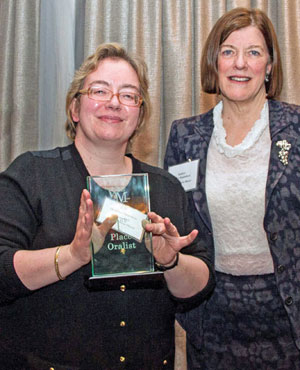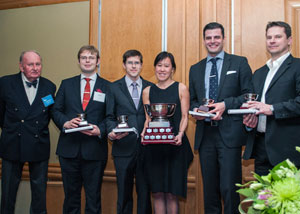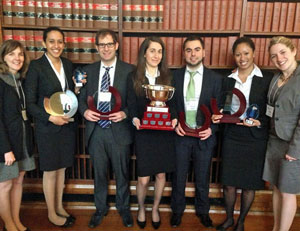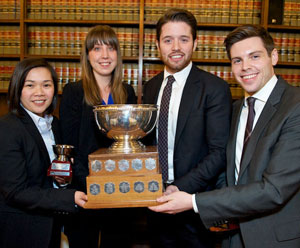From jury trials to corporate advocacy, Canadian law students competed fiercely during this year’s mooting season. Now that it has come to an end, the results gathered by
4Students show Osgoode Hall Law School was home to quite a few winners this year. While several Canadian teams are proud to be going on to international moot competitions, other students are heading to the library to complete the semester.
Canadian Client Consultation Competition: This competition is a simulated office consultation between two law students and a client. The students are evaluated on their ability to present the client with their options, explain the relevant laws, and assist them in selecting a solution. It was held at Queen’s University Feb. 23-24. This year’s winners will represent Canada in Scotland at the Louis M. Brown and Forrest S. Mosten International Client Consultation Competition in April.
Overall winner: Osgoode (Ann Marina Guirguis & Rebecca Hall-McGuire)
Davies Ward Phillips & Vineberg LLP Corporate/Securities Law Moot: Recognized as the leading corporate law moot, this competition requires students to debate issues in corporate and security law with senior practitioners from Toronto law firms. The students are tested on written and oral advocacy. The event took place March 8-9 in Toronto.
1st: University of Toronto
2nd: University of Calgary
3rd: McGill University
Top oralist: Gunnar Benediktsson (University of Calgary)
Best factum: University of Toronto
Chaitons LLP Corporate Restructuring Advocacy Competition: At this second annual competition on March 6, students mooted the decision in
Newfoundland and Labrador v. AbitibiBowater Inc.. The competition focuses on appellate advocacy in corporate law and was created by two students.
Best appellant team: Western University (Samantha Tom & Teanna Lobo)
Best respondent: Western (Anna Tombs & Casey Marvin)
First-Year Appellate Competition Student Moot: This year’s competition on March 19 for first-year Western law students required teams to address the judgment in
R. v. Hutchinson, a case involving a man who punched holes in a condom to try to get his girlfriend pregnant.
Winner: Kimberly Asnani
Finalists: Mark Bout, Lindsey Hornland & Evan Stitt
Mathews Dinsdale & Clark National Labour Arbitration Competition: This moot was created to explore the unique issues in labour law advocacy. The event holds a simulated grievance arbitration hearing before tri-partite panels. It was held Jan. 25-27 in Toronto.
Overall winner: University of Alberta (Natasha Edgar & Avril Fisher)
Julius Alexander Isaac Diversity Moot: The Black Law Students’ Association of Canada organizes this moot every year. It focuses on equity and diversity issues, including diversity law, human rights, and equity issues. Held on Feb. 23, this year’s problem focused on the importance of race in the adoption process.
Winner: University of Toronto
Best oralist: Jonathan Chan (University of Toronto)
Hicks Cup: The Hicks Cup, sponsored by Hicks Morley Hamilton Stewart Storie LPP, was held at its Toronto office on March 22. Lawyers from Hicks Morley and union-side lawyers acted as arbitrators for the competition.
1st: University of Ottawa (Andrew Bigoni & Sandro Giammaria)
2nd: University of Windsor (Jillian Mulroy & Kathleen Tate)
Kawaskimhon Moot: Western law hosted the 2013 Kawaskimhon Talking Circle Moot. This moot is concerned with aboriginal issues and open to aboriginal and non-aboriginal law students across Canada. This is a non-competitive moot conducted in a circle format. The objective of the moot is to reach a consensus on the problem. It was held March 1-3 at Western University.
 Wilson Moot:
Wilson Moot: Founded in 1992, the Wilson Moot promotes justice for the disempowered within the legal system. It is named after the late Supreme Court of Canada justice Bertha Wilson. This year’s moot dealt with fictional amendments to the Criminal Code that would permit physician-assisted suicide in limited circumstances. The mooters were asked to address whether the denial of access to a physician-assisted suicide for an individual with a mental illness violates the Charter of Rights and Freedoms. The final moot, held in Toronto Feb. 22-23, was between the top two teams from the University of Windsor and the University of Toronto this year.
1st: University of Windsor
2nd: University of Toronto
3rd: Osgoode
Best written argument: U of T
Best oralist: Heather MacIvor
Best factums: U of T
Lenczner Slaght-CBA Gale Cup: This bilingual moot, held Feb. 22-23 in Toronto, celebrated 40 years in 2013. This year’s case is
R. v. D.A.I. [http://scc.lexum.org/decisia-scc-csc/scc-csc/scc-csc/en/item/7990/index.do], which addresses the testimonial competence of adults with mental disabilities. The accused was charged with repeatedly sexually assaulting a 26-year-old woman with the mental age of a three- to six-year-old and was acquitted at trial. The winner will compete at the Canada Commonwealth Moot in Cape Town in April.
1st: Osgoode
2nd: Université du Québec à Montréal
3rd: University of Alberta
4th: Université Laval
McLachlin prize for best female mooter: Julie Anne Marinier (UQAM)
Peter Cory prize for best factum: Lara Kinkartz & Phi Nguyen (Osgoode)
Harold G. Fox Intellectual Property Moot: The Fox Moot is named after one of Canada’s leading intellectual property scholars and advocates. In its fifth year, it deals with issues related to intellectual property laws. This year’s case was between Thoman Hardie Music Inc. and Michael Cane, which deals with copyright infringements on a comic web site. It was held Feb. 22-23.
Overall winner: Osgoode (David Bowden & Robert Trenker)
Dimock Stratton Award for mooting excellence: Kevin Siu (University of Toronto)
Gordon F. Henderson award for best factum: Ryan Heighton & Ryan Keller (Osgoode)
Donald F. Sim award for best oralist: Kevin Siu (University of Toronto)
 Donald G.H. Bowman National Tax Moot:
Donald G.H. Bowman National Tax Moot: This is Canada’s first tax moot, named after the former chief justice of the Tax Court of Canada. In its third year, the case was
Leblanc v. The Queen, which dealt with whether or not gambling winnings should be exempt from tax. It was held March 1-2.
Overall winner: University of Alberta
Best advocate: Hamid Nuri (University of Ottawa)
Best factum-appellant: Western University
Best factum-respondent: University of Toronto
Hockey Arbitration Competition: This new sports law moot was a salary arbitration competition modeled on the procedures used in the National Hockey League. Created by U of T students last fall, its aim is to give students a chance to sharpen their advocacy skills and gain some experience in the sports law industry. It was held Oct. 5-6, 2012.
1st: Queen’s University (Alex Radin & Chelsea Ritchie)
2nd: University of Windsor (Dan Di Fonzo & Matt Rossetti)
Semi-finalist: Queen’s University (Zahir Ali & Megan Rolland)
Semi-finalist: University of Windsor (Scott Buchanan & Roy Gentles)
Walsh Family Law Moot: This is the first year for this moot, held in Toronto on March 16 at the Ontario Court of Appeal. It was created to simulate the high-conflict environment of family law. It’s named after former justice George Walsh, lead of the family law division of the Superior Court of Justice in Toronto.
Overall winner: Osgoode
First place oralist: Camille Dunbar (Osgoode)
Second place oralists: Margaret Scull & Nansy Ghobriel (University of Ottawa)
Third place oralists: Colin McElrea (Western University) & Ann Marina Guirguis (Osgoode)
Top appellant team: Osgoode (Ann Marina Guirguis & Jeremy Loeb)
Top respondent team: Osgoode (Camille Dunbar & Florind Polo)
 2013 Oxford International Intellectual Property Moot:
2013 Oxford International Intellectual Property Moot: Each year teams from around the world compete in this moot at the University of Oxford in England. This year’s problem dealt with trademark infringements in the pharmaceutical industry, held March 14-16.
Overall winner: University of Ottawa
Ontario Trial Lawyers’ Association Cup: This annual mock trial competition is held in a different courthouse each year and presided over by a local judge. On March 2 it was in Toronto before Justice T. Mark McEwan.
Bergeron Clifford award for best team: Osgoode (Emily Wunder & Matt Masters)
George Bonn award for best cross-examination: Manav Singhla (Queen’s)
Tim Boland award for best overall advocate: Rachel McMillan (Western)
Will Davidson award for best opening argument: Emily Wunder (Osgoode)
Greg Monforton award for best examination-in-chief: Bianca Bielecki (University of Ottawa)
H. Bruce T. Hillyer award for best closing argument: Melissa Novis (Windsor)
Bora Laskin Moot: The Laskin is a national bilingual moot dealing with administrative and constitutional law. It is named after the late Supreme Court of Canada chief justice Bora Laskin who was one of Canada’s leading legal scholars and jurists. This year’s fictional case was
King & Co. Importing Inc. v. Marie-Stella, which dealt with harassment and discrimination issues based on ethnicity in the workplace. It was held March 2.
1st: University of Alberta
2nd: McGill University
3rd: Osgoode
4th: University of Toronto
Best factum: University of Ottawa
Best pairs: Queen’s (Véronique Ethier & Guillaume Leahy)
Spirit of the Laskin award: Université de Montréal
Willms & Shier Environmental Law Moot: In partnership with Osgoode Hall Law School, Willms & Shier Environmental Lawyers LLP started Canada’s first-ever national environmental competition in 2011. This year, it was held in Toronto on March 9. The case up for debate was the Ontario Court of Appeal’s 2011 decision in
Smith v. Inco Ltd., which revolved around liability for land contaminated by industrial pollution.
1st: University of British Columbia (Jessica Todd, Meghan Trepanier & Sarah McCalla)
2nd: Osgoode (Jesse Cohen & Luke Johnston)
3rd: University of Victoria (Kathryn Duke, Bruce Warnsby & Siddarth Akali)
First place oralist: Luke Johnston (Osgoode)
Best appellant factum: UBC
Best respondent factum: University of Victoria
SOPINKA CUPREGIONALS
Arnup Cup: This moot is open to Ontario law schools. It’s a competition in trial advocacy and structured as a jury trial. It was held on Feb. 8-9.
Winner: University of Toronto
Guy-Guérin Cup: This annual qualifying bilingual competition is held in Quebec with a focus on criminal law. It was held on Feb. 14-15.
Winner: McGill University
Western/McIntyre Cup: This moot is open to law schools in Western Canada. It is in the form of a mock trial in a criminal prosecution. This year it was held at the University of Victoria Feb. 14-16.
Winner: University of Saskatchewan
McKelvey Cup:This is the qualifying round for eastern Canadian law students. It was held on Feb. 15-16.
Winner: Dalhousie University
 Sopinka Cup
Sopinka Cup: Participants are involved in a jury trial related to criminal law. Unlike other moots, the Sopinka Cup is structured like a trial rather than the argument of a case on appeal, so students involved must demonstrate their skills in courtroom advocacy. This year it was held in Ottawa March 15-16.
1st: Dalhousie University
2nd: University of Ottawa
3rd: University of British Columbia
Best opening address: Suzanne Kittell (Dalhousie)
Best closing address: Marie-Pier Emery (Université d’Ottawa)
Best direct examination: Kendra Carfantan (University of Manitoba)
Best cross-examination: Silvana Lovera (UBC)
Best overall advocate: Marie-Pier Emery (Université d’Ottawa)
White & Case Canadian National Division Qualifying Tournament:This moot is open to all law schools in Canada to qualify for the Phillip C. Jessup International Law Moot Court Competition. This year it was held in Kingston, Ont., March 6-9.
Qualifying teams: Western University and Queen’s University
Phillip C. Jessup International Law Moot Court Competition: The Jessup moot is usually based on a controversial topic of public international law. Most Canadian law schools compete in the final round, held on a different campus each year. The final round is hosted by the American Society of International Law. The 2013 moot will explore the factual and legal consequences of climate change on statehood, migration, and foreign sovereign debt. It will be held in Washington, D.C., on March 31 to April 6.
Update: April 5. Willms & Shier Environmental Law Moot results added.

 Wilson Moot: Founded in 1992, the Wilson Moot promotes justice for the disempowered within the legal system. It is named after the late Supreme Court of Canada justice Bertha Wilson. This year’s moot dealt with fictional amendments to the Criminal Code that would permit physician-assisted suicide in limited circumstances. The mooters were asked to address whether the denial of access to a physician-assisted suicide for an individual with a mental illness violates the Charter of Rights and Freedoms. The final moot, held in Toronto Feb. 22-23, was between the top two teams from the University of Windsor and the University of Toronto this year.
Wilson Moot: Founded in 1992, the Wilson Moot promotes justice for the disempowered within the legal system. It is named after the late Supreme Court of Canada justice Bertha Wilson. This year’s moot dealt with fictional amendments to the Criminal Code that would permit physician-assisted suicide in limited circumstances. The mooters were asked to address whether the denial of access to a physician-assisted suicide for an individual with a mental illness violates the Charter of Rights and Freedoms. The final moot, held in Toronto Feb. 22-23, was between the top two teams from the University of Windsor and the University of Toronto this year. Donald G.H. Bowman National Tax Moot: This is Canada’s first tax moot, named after the former chief justice of the Tax Court of Canada. In its third year, the case was Leblanc v. The Queen, which dealt with whether or not gambling winnings should be exempt from tax. It was held March 1-2.
Donald G.H. Bowman National Tax Moot: This is Canada’s first tax moot, named after the former chief justice of the Tax Court of Canada. In its third year, the case was Leblanc v. The Queen, which dealt with whether or not gambling winnings should be exempt from tax. It was held March 1-2. 2013 Oxford International Intellectual Property Moot: Each year teams from around the world compete in this moot at the University of Oxford in England. This year’s problem dealt with trademark infringements in the pharmaceutical industry, held March 14-16.
2013 Oxford International Intellectual Property Moot: Each year teams from around the world compete in this moot at the University of Oxford in England. This year’s problem dealt with trademark infringements in the pharmaceutical industry, held March 14-16. Sopinka Cup: Participants are involved in a jury trial related to criminal law. Unlike other moots, the Sopinka Cup is structured like a trial rather than the argument of a case on appeal, so students involved must demonstrate their skills in courtroom advocacy. This year it was held in Ottawa March 15-16.
Sopinka Cup: Participants are involved in a jury trial related to criminal law. Unlike other moots, the Sopinka Cup is structured like a trial rather than the argument of a case on appeal, so students involved must demonstrate their skills in courtroom advocacy. This year it was held in Ottawa March 15-16.